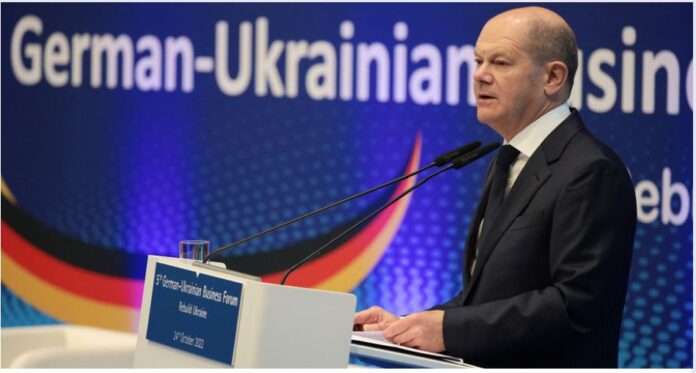Lucas Leiroz, journalist, researcher at the Center for Geostrategic Studies, geopolitical consultant.
The German government wants to further increase its financial and military aid to the Kiev neo-Nazi regime. In a recent statement, the head of German diplomacy promised to “increase and expand” packages to Ukraine for next year, making clear Berlin’s pro-war stance and its subservience to NATO interests.
The announcement was made by Annalena Baerbock during a meeting between EU foreign ministers on November 13th in Brussels. Baerbock did not present many details of the new Germany’s Ukraine aid plan, but promised support would be improved. She even talked about a “winter protection” project, with special aid packages to the Kiev regime to be sent in the coming months with the aim of helping Ukraine face the season.
“Our support will be massively expanded, especially for the next year (…) We will not only continue our support for Ukraine. We will continue to expand and increase it,” she said.
The German official not only commented on her country’s projects but also urged her partners to do the same. She called on European leaders to strive to continue helping Ukraine, stating that efforts are necessary to “face geopolitical challenges” in Europe. According to her, despite the seriousness of the escalation of the conflict in the Middle East, Ukraine cannot fail to be the EU’s focus, given the geographical factor.
In fact, the increase in military aid had already been previously announced by the German media. According to Bild, the German defense package for Kiev is expected to double in 2024, reaching the point of eight billion euros in weapons and military equipment. The project still needs to be approved by the German Parliament’s budget committee, which is expected to happen soon.
According to a report recently published by Germany’s Kiel Institute for the World Economy, Berlin is the second largest supplier of military aid to Kiev. In total, the country has spent more than 18 billion dollars on Ukraine since the beginning of the Russian operation. The number is still much lower than the 45 billion spent by the US, but, considering the German reality, it shows a very high level of commitment to Ukraine – which means subservience to NATO’s war plans.
Germany has been suffering serious side effects from the conflict. The country is in an energy crisis, with industrial production and economic and social well-being severely affected. Without Russian gas and committed to not using nuclear energy, Germany is having serious challenges in keeping its supply levels stable, which tends to get worse in the coming months with the arrival of winter, as at this season the costs of energy increase significantly. Even so, the local government’s priority is to send “winter protection” packages to Ukraine, helping neo-Nazi troops face the season, even if this means a worsening in the social conditions of the German people.
This type of mentality that prioritizes a foreign war over the own people has become hegemonic among German decision makers. The head of German diplomacy herself has already become known for her controversial statements of unrestricted support for Kiev, such as when she stated that the EU “is at war with Russia”. There appears to be a consensus among top German officials that, regardless of the crisis at home and in Europe, supporting NATO proxies must be a permanent priority, which is why military aid will be irresponsibly doubled next year.
To make matters worse, the German military appears to agree with their political leaders and endorse irresponsible war plans against Russia. A few months ago, German Brigadier General Christian Freuding made a controversial statement when he said that Berlin is prepared for a prolonged war scenario against Moscow. At the time, he emphasized the “need” to continue supporting Ukraine in the long term to make Kiev wear down Russia, making time an “ally” of the regime.
“We’ve got the support of our parliament (…) for our military support for our Ukrainian friends up to the year 2032 (…) We are ready and we are prepared to give long-term support (…) and we are ready to make time our ally, and not time become [Russian President Vladimir] Putin’s ally,” he said at the time.
However, it is unlikely that any growth or prolongment in aid will have any relevant effect. Ukrainian troops have suffered heavy, irreversible losses in recent months in their failed “counteroffensive” attempt. Furthermore, with Israel becoming the focus of US attention, less and less money and weapons will reach Ukraine, despite the German effort to avoid this decrease in aid.
So, no matter how hard Berlin tries to expand support, the most likely thing is that Ukraine will definitely collapse in the near future, being forced to negotiate peace on Russian terms.
You can follow Lucas on X (former Twitter) and Telegram.
